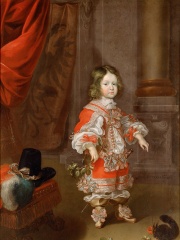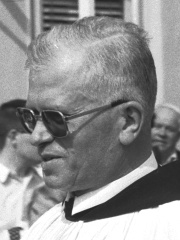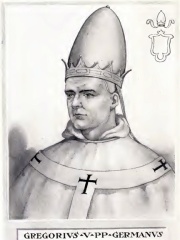
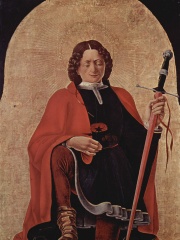
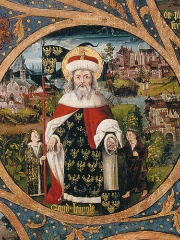
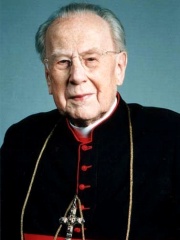
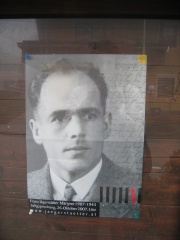
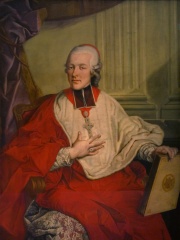
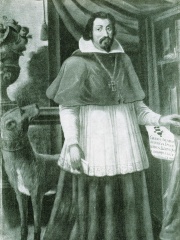

The Most Famous
RELIGIOUS FIGURES from Austria
This page contains a list of the greatest Austrian Religious Figures. The pantheon dataset contains 3,187 Religious Figures, 22 of which were born in Austria. This makes Austria the birth place of the 24th most number of Religious Figures behind Ukraine, and Czechia.
Top 10
The following people are considered by Pantheon to be the top 10 most legendary Austrian Religious Figures of all time. This list of famous Austrian Religious Figures is sorted by HPI (Historical Popularity Index), a metric that aggregates information on a biography's online popularity. Visit the rankings page to view the entire list of Austrian Religious Figures.

1. Pope Gregory V (972 - 999)
With an HPI of 78.20, Pope Gregory V is the most famous Austrian Religious Figure. His biography has been translated into 74 different languages on wikipedia.
Pope Gregory V (Latin: Gregorius V; c. 972 – 18 February 999), born Bruno of Carinthia, was the bishop of Rome and ruler of the Papal States from 3 May 996 to his death. A member of the Salian dynasty, he was made pope by his cousin, Emperor Otto III.

2. Saint Florian (250 - 304)
With an HPI of 74.28, Saint Florian is the 2nd most famous Austrian Religious Figure. His biography has been translated into 34 different languages.
Florian (Latin: Florianus; AD 250 – c. 304) was a Christian holy man and the patron saint of chimney sweeps, soapmakers, and firefighters. His feast day is 4 May. Florian is also the patron saint of Poland; the city of Linz, Austria; and Upper Austria, jointly with Leopold III, Margrave of Austria.

3. Leopold III, Margrave of Austria (1073 - 1136)
With an HPI of 68.37, Leopold III, Margrave of Austria is the 3rd most famous Austrian Religious Figure. His biography has been translated into 31 different languages.
Leopold III (German: Luitpold, Latin: Leupoldus, 1073 – 15 November 1136), known as Leopold the Good, was the Margrave of Austria from 1095 to his death in 1136. He was a member of the House of Babenberg. He was canonized on 6 January 1485 and became the patron saint of Austria, Lower Austria, Upper Austria and Vienna. His feast day is 15 November.

4. Franz König (1905 - 2004)
With an HPI of 66.38, Franz König is the 4th most famous Austrian Religious Figure. His biography has been translated into 26 different languages.
Franz König (3 August 1905 – 13 March 2004) was an Austrian Cardinal of the Catholic Church. He served as archbishop of Vienna from 1956 to 1985, and was elevated to the cardinalate in 1958. The last surviving cardinal elevated by Pope John XXIII, he was the longest-serving and second-oldest cardinal worldwide at the time of his death.
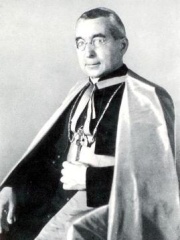
5. Alois Hudal (1885 - 1963)
With an HPI of 64.84, Alois Hudal is the 5th most famous Austrian Religious Figure. His biography has been translated into 21 different languages.
Alois Karl Hudal (also known as Luigi Hudal; 31 May 1885 – 13 May 1963) was an Austrian bishop of the Catholic Church and Nazi sympathizer, based in Rome. For thirty years, he was the head of the Austrian-German congregation of Santa Maria dell'Anima in Rome and, until 1937, an influential representative of the Catholic Church in Austria. In his 1937 book, The Foundations of National Socialism, Hudal praised Adolf Hitler and his policies and indirectly attacked Vatican policies. After World War II, Hudal helped establish the ratlines, which allowed prominent Nazi German and other European former Axis officers and political leaders, among them accused war criminals, to escape Allied trials and denazification.

6. Franz Jägerstätter (1907 - 1943)
With an HPI of 64.79, Franz Jägerstätter is the 6th most famous Austrian Religious Figure. His biography has been translated into 25 different languages.
Franz Jägerstätter, (also spelled Jaegerstaetter in English; born Franz Huber, 20 May 1907 – 9 August 1943) was an Austrian farmer and conscientious objector during World War II. Jägerstätter was sentenced to death and executed for his refusal to fight for Nazi Germany. He is venerated as a martyr and has been beatified by the Catholic Church.

7. Hieronymus von Colloredo (1732 - 1812)
With an HPI of 64.33, Hieronymus von Colloredo is the 7th most famous Austrian Religious Figure. His biography has been translated into 19 different languages.
Hieronymus Joseph Franz de Paula Graf Colloredo von Wallsee und Melz (German pronunciation: [hiˈʁɔnimʊs ˈjoːzɛf ˈfʁants də ˈpaʊla ˈɡʁaːf kɔloˈʁeːdo fɔn ˈvalzeː ʊnt ˈmɛlts]; Jérôme Joseph Franz de Paula, Count of Colloredo-Wallsee and Mels; 31 May 1732 – 20 May 1812) was Prince-Bishop of Gurk from 1761 to 1772 and Prince-Archbishop of Salzburg from 1772 until 1803, when the prince-archbishopric was secularized. After secularization, Colloredo fled to Vienna and remained the non-resident archbishop of Salzburg, bereft of temporal power, until his death in 1812. He is most famously known as a patron and employer for Mozart.

8. Charles of Austria, Bishop of Wroclaw (1590 - 1624)
With an HPI of 63.81, Charles of Austria, Bishop of Wroclaw is the 8th most famous Austrian Religious Figure. Her biography has been translated into 19 different languages.
Charles of Austria (German: Karl von Österreich; 7 August 1590 – 28 December 1624), nicknamed the Posthumous, a member of the Imperial House of Habsburg, was Prince-Bishop of Breslau (Wrocław) from 1608, Prince-Bishop of Brixen from 1613, and Grand Master of the Teutonic Order from 1618 until his death. In 1621 he also received the Bohemian County of Kladsko as a fief from the hands of his brother, Emperor Ferdinand II.

9. Hermann Gmeiner (1919 - 1986)
With an HPI of 62.29, Hermann Gmeiner is the 9th most famous Austrian Religious Figure. His biography has been translated into 25 different languages.
Hermann Gmeiner (23 June 1919 – 26 April 1986) from Austria founded the charity SOS Children's Villages.

10. Maria Schicklgruber (1795 - 1847)
With an HPI of 62.28, Maria Schicklgruber is the 10th most famous Austrian Religious Figure. Her biography has been translated into 20 different languages.
Maria Anna Schicklgruber (15 April 1795 – 6 January 1847) was the mother of Alois Hitler, and the paternal grandmother of Adolf Hitler.
People
Pantheon has 23 people classified as Austrian religious figures born between 250 and 1963. Of these 23, 1 (4.35%) of them are still alive today. The most famous living Austrian religious figures include Josef Grünwidl. The most famous deceased Austrian religious figures include Pope Gregory V, Saint Florian, and Leopold III, Margrave of Austria. As of April 2024, 1 new Austrian religious figures have been added to Pantheon including Josef Grünwidl.
Living Austrian Religious Figures
Go to all RankingsDeceased Austrian Religious Figures
Go to all RankingsPope Gregory V
972 - 999
HPI: 78.20
Saint Florian
250 - 304
HPI: 74.28
Leopold III, Margrave of Austria
1073 - 1136
HPI: 68.37
Franz König
1905 - 2004
HPI: 66.38
Alois Hudal
1885 - 1963
HPI: 64.84
Franz Jägerstätter
1907 - 1943
HPI: 64.79
Hieronymus von Colloredo
1732 - 1812
HPI: 64.33
Charles of Austria, Bishop of Wroclaw
1590 - 1624
HPI: 63.81
Hermann Gmeiner
1919 - 1986
HPI: 62.29
Maria Schicklgruber
1795 - 1847
HPI: 62.28
Archduke Charles Joseph of Austria
1649 - 1664
HPI: 62.25
Hans Hermann Groër
1919 - 2003
HPI: 61.01
Newly Added Austrian Religious Figures (2025)
Go to all RankingsOverlapping Lives
Which Religious Figures were alive at the same time? This visualization shows the lifespans of the 15 most globally memorable Religious Figures since 1700.


